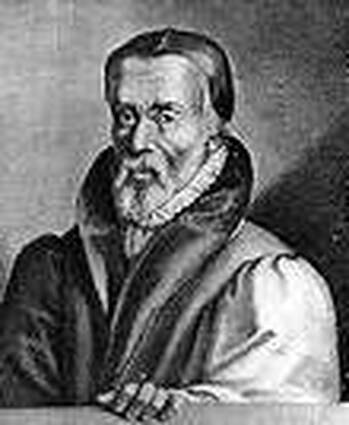Henry VIII,the Reign |
William Tyndale
Translator of the Bible, Author and Religious Reformer
Born: c 1494, Gloucestershire, possibly Stinchcombe
Died: c 6 October 1536 Vilvoorde Castle, modern Belgium
Aged: 42
Profile of William Tyndale Translator of the Bible, Author and
Religious Reformer
 William Tyndale
William Tyndale
WILLIAM TYNDALE, translator of the New Testament and Pentateuch, was born in Gloucestershire, possibly at Stinchcombe sometime between 1490 and 1495. In Easter term 1510 he went to Oxford, where Foxe says he was entered of Magdalen Hall. He took his M.A. degree in 1515 and removed to Cambridge, where Erasmus had helped to establish a reputation for Greek and theology.
Ordained to the priesthood, probably towards the close of 1521, he entered the household of Sir John Walsh, Old Sodbury, Gloucestershire, as chaplain and domestic tutor. Here he lived for two years, using his leisure in preaching in the villages and at Bristol, conduct which brought him to clash with the traditional clergy of the district, and led to his being summoned before the chancellor of Worcester (William of Malvern) as a suspected heretic; but he was allowed to depart without receiving censure or giving any undertaking.
But the persecution of the clergy led him to seek an antidote for what he regarded as the corruption of the Church, and he resolved to translate the New Testament into the vernacular. In this he hoped to get help from Cuthbert Tunstall, bishop of London, and so "with the good will of his master" he left Gloucester in the summer of 1523. Tunstall disappointed him, so he got employment as a preacher at St Dunstan's-in-the-West, and worked at his translation, living as chaplain in the house of Humphrey Monmouth, an alderman, and forming a firm friendship with John Frith; but finding publication impossible in England, he sailed for Hamburg in May 1524.
After visiting Luther at Wittenberg, he settled with his amanuensis (his clerical assistant ) friar William Roy in Cologne, where he had made some progress in printing a 4to edition of his New Testament, when the work was discovered by John Cochlaeus, dean at Frankfurt, who not only got the senate of Cologne to interdict further printing, but warned Henry VIII and Wolsey to watch the English ports. Tyndale and Roy escaped with their sheets to Worms, where the 8vo edition was completed in 1526.
Copies were smuggled into England but were suppressed by the bishops, and William Warham, Archbishop of Canterbury, even bought up copies on the Continent to destroy them. Attempts were made to seize Tyndale at Worms, but he found refuge at Marburg with Philip, landgrave of Hesse. There he probably met Patrick Hamilton, and was joined by John Frith.
About this time he changed his views on the Eucharist and swung clean over from transubstantiation to the advanced Zwinglian position. His Parable of the Wicked Mammon (1528), Obedience of a Christen Man (1528), in which the two great principles of the English Reformation are set out, viz. the authority of Scripture in the Church and the supremacy of the king in the state, and Practyse of Prelates (1530), a strong indictment of the Roman Church and also of Henry VIII's divorce proceedings, were all printed at Marburg. In 1529 on his way to Hamburg he was wrecked on the Dutch coast, and lost his newly completed translation of Deuteronomy. Later in the year he went to Antwerp where he conducted his share of the classic controversy with Sir Thomas More.
After Henry VIII's change of attitude towards Rome, Stephen Vaughan, the English envoy to the Netherlands, suggested Tyndale's return, but the reformer feared ecclesiastical hostility and declined.
Henry then demanded his surrender from the emperor as one who was spreading sedition in England, and Tyndale left Antwerp for two years, returning in 1533 and busying himself with revising his translations. In May 1535 he was betrayed by Henry Phillips, to whom he had shown much kindness as a professing student of the new faith. The imperial officers imprisoned him at Vilvorde Castle, the state prison, 6 miles from Brussels, where in spite of the great efforts of the English merchants and the appeal of Thomas Cromwell to Archbishop Carandolet, president of the council, and to the governor of the castle, he was tried for heresy and condemned. On the 6th of August 1536 he was strangled at the stake and his body afterwards burnt.
